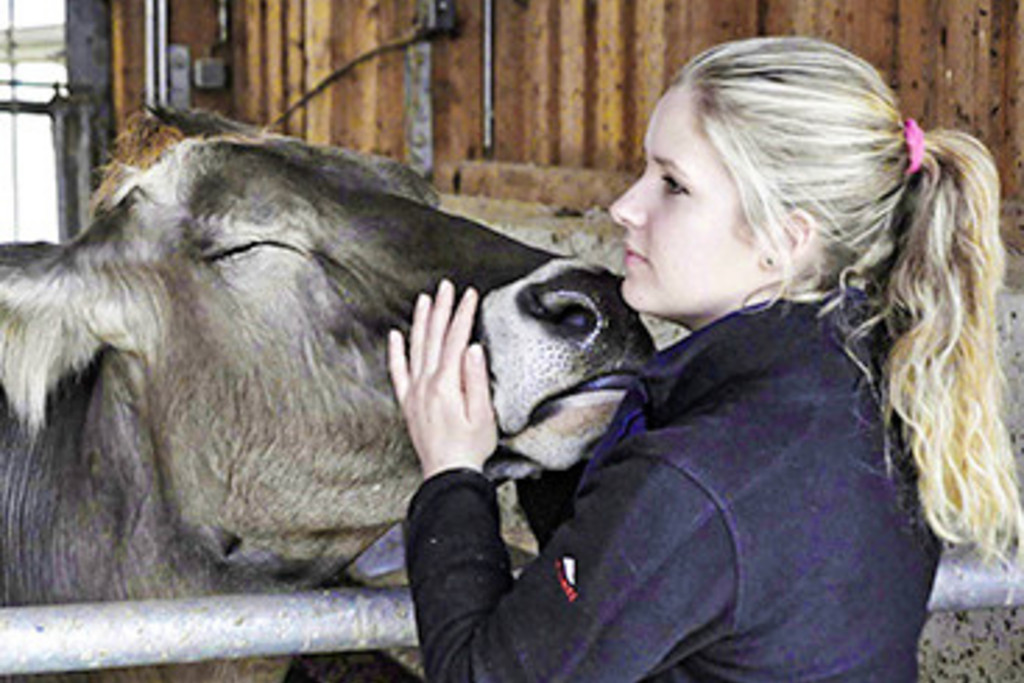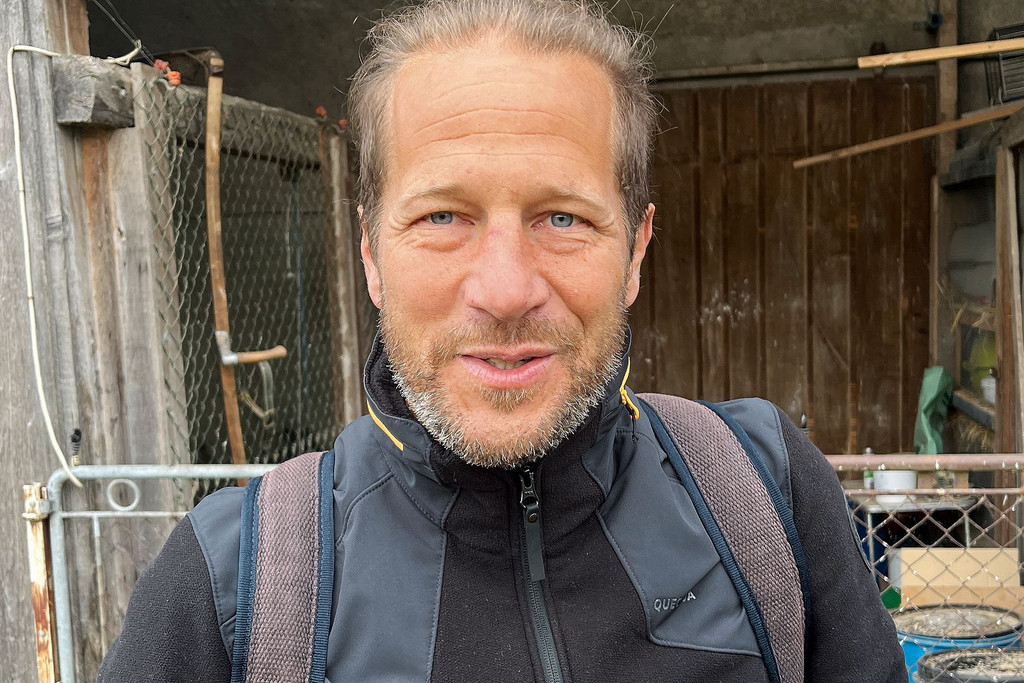Meeting the musician Patricia Kopatchinskaja is always an eventful experience. Whether she is giving a virtuoso performance on stage or simply talking about music, the 41-year-old violinist exudes energy and ingenuity. She is well-known to audiences and notorious amongst conductors and orchestras for her spontaneity. Once she puts the violin bow on the strings, absolutely anything can happen. Whether it is Beethoven, Bartok or a contemporary composer, Kopatchinskaja plays the violin with such intensity and directness it seems the ink of the notes she is playing is still wet. The fact that she never learns music by heart out of principle may come as a surprise. She has her reasons for this: “Notes give me the room for manoeuvre I require,” she remarks. “Playing music is about more than hitting the right notes. As an interpreter, I have to explore and reveal the meaning behind the notes.”
Every concert should be as immediate and fresh as the opening performance. Kopatchinskaja pays little heed to convention. This may explain why she is continually challenging classical music, but also herself. It is precisely this approach which is doing the concert business so much good. She was long unaware that her inclination for casting famous pieces of the repertoire in a new light was polarising audiences. She has now learned to cope with that. However, audiences have also become more receptive and curious. Today she often finds that people respond to her unconventional style with indignation when they first hear it. Then when they listen for the second time they are euphorically enthusiastic. This was also the case in 2016 at the memorable concert for which she has now won a Grammy for Best Chamber Music Performance.
Always barefoot
The award is seen as the greatest international accolade for musicians and is often compared with the Oscars in the film industry in terms of its importance. Although the prize has been presented in Los Angeles since 1959, Kopatchinskaja’s award is only the fourth Grammy to go to Switzerland. What was so remarkable about the concert? You have to visualise the scene. At the Ordway Concert Hall in Saint Paul, Minnesota, the audience was waiting for the music of Schubert. The personification of death unexpectedly appeared on stage next to the orchestra. Inside the black costume with its skeleton print was Patricia Kopatchinskaja. She came up with the idea of the fleeting, unearthly spectre. The audience could have recognised the soloist by her bare feet. The 41-year-old extraordinarily talented violinist always performs barefoot as it makes her feel more grounded. However, the clothing was not an end in itself. It went with the programme she was performing live with the Saint Paul Chamber Orchestra.
The centrepiece was a version of Franz Schubert’s quartet “Death and the Maiden” that she had rearranged herself for the chamber orchestra. But even without that the piece sounds unfamiliar. Kopatchinskaja broke it up and interspersed additional pieces of music about death between Schubert’s movements. They came from all eras – from Baroque to the present day. The unconventional collage was skilfully pieced together, producing a perfectly composed programme made up of pieces which do not actually belong together but nevertheless complement one another. But that was not all. While playing, Kopatchinskaja sang Schubert’s song “Death and the Maiden” with lyrics by Matthias Claudius, on which the quartet is based. The audience’s reaction was one of bewilderment. Initially at least, but in the end they were moved to tears.
Thought-provoking
“It was a little bit mad,” recalls the violinist with a smile during the interview in Berne, where she now lives with her husband and daughter. “In Europe, they would have packed me off to the funny farm after a performance like that, but you can take such gambles in the USA.” Those close to her know that she never does such things simply for effect. When she tests boundaries, it is always about the music itself. She likes to provoke thought. “I am always looking for what lies behind the notes,” explains the musician who performs over 100 concerts a year all over the world.
She has been a star for some time now despite never wanting to be one. Kopatchinskaja much prefers to meet the audience on equal terms. When she releases classical music from its ivory tower with her impassioned performances, she also puts it out on the street, making it accessible to ordinary people. She reveals that she enjoys taking people on a musical journey of discovery during concerts. But she warns: “Nothing ever runs smoothly with me as the tour guide.”
Kopatchinskaja regrets the lack of vibrancy on the classical music scene and the fact that much has remained the same for centuries. “A concert should change the lives of everyone in the audience a little,” she points out. She believes classical concerts today are often like visiting a mausoleum of dead composers. “People go to look at the corpses. They are expected to sit there in a dignified manner and move as little as possible.” “Repetitions of the same thing do not appeal to me,” says the musical interpreter. “If that is what you want, then listen to a CD. I’m not a copying machine.”
Profound and willing to take risks
Patricia Kopatchinskaja is a determined campaigner against pigeonholes in the mind and templates in classical music. Art is never about what you already know. She strongly believes that “art must raise questions and turn things on their head”. The messages of this profound musician who likes to take risks are now being heard. In addition to this year’s Grammy, in 2017 she also picked up the Swiss Grand Prix for Music, one of the highest accolades in her profession. Kopatchinskaja attends international festivals, composes, makes recordings and plays chamber music and concerts with the best orchestras in the world. In autumn 2018, she will also take over the highly regarded Camerata Bern as its artistic director. Where does her creativity, deep sense of musicality and artistic talent come from? Patricia Kopatchinskaja does not take long to answer this. She inherited her stubborn nature and passion from her father Viktor Kopatchinski, a virtuoso cymbals player, and her composure and intensity while performing from her mother, who is a violinist. The environment she grew up in keeps her grounded.
Kopatchinskaja was born in Chisinau in Moldova, one of the poorest countries in Europe. She had a difficult but happy childhood and recalls the idyllic village where she grew up amongst hens and cornfields with her grandparents while her parents toured the Soviet Union as professional folk musicians. Her father was a highly successful musician but not a party member and, as the occupying forces in Moldova constantly changed, the family never knew what the future held. “My father was not allowed to go abroad. That’s why we fled.” They emigrated to Vienna where she and her family lived in terrible poverty. However, the young violinist had a lucky break. A scholarship allowed her to come to Berne where she feels safe and secure. She believes the city plays an important part in her work and for her soul, which sometimes needs tranquillity. “Berne is sedate and slow-paced. I’m never distracted here and can focus on my work. Until I set off again.” Patricia Kopatchinskaja has entered the pantheon of classical musicians. She has reached the very top. However, she has not achieved all of her goals just yet. Her restless soul continually drives her in search of new musical secrets. “That’s what I live for.”
Marianne Mühlemann is culture EDItor AT the “Der Bund” newspaper
Patricia Kopatchinskaja
Patricia Kopatchinskaja, born in 1977, grew up in a family of musicians in Chisinau, Moldova. The family emigrated to Austria in 1989. Kopatchinskaja studied the violin and composition in Vienna before moving to Berne in 1998 thanks to a scholarship. She has received many awards, winning the Henryk Szeryng Competition in Mexico in 2000, the International Credit Suisse Group Young Artist Award in 2002 and the German Radio Prize for Outstanding Talent in 2006. She also won the Swiss Grand Prix for Music endowed with 100,000 Swiss francs in 2017 and a Grammy Award in the Best Chamber Music Performance category in January 2018. She is also known to the wider public thanks to Swiss customs officials who confiscated her valuable Guarneri violin, which was a loan, making news headlines. Kopatchinskaja is married to the former neurologist and author Lukas Fierz. They have a daughter together and live in Berne. In autumn 2018, Kopatchinskaja will take over the Camerata Bern as its new artistic director.
Picture A determined campaigner against pigeonholes in the mind and templates in classical music: Patricia Kopatchinskaja. Photo Keystone











Comments